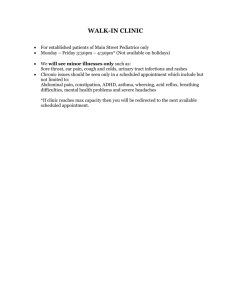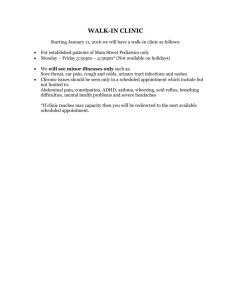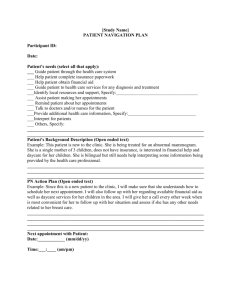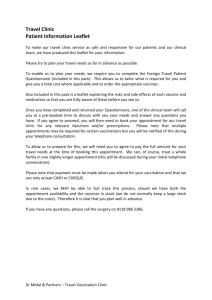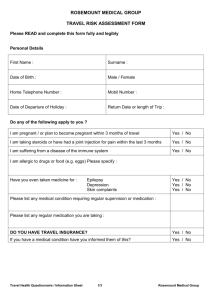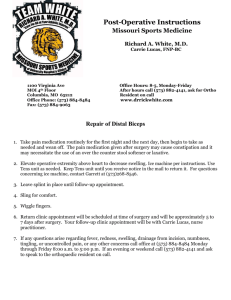Diagnostic and Advisory Service for Rare Neuromuscular Diseases Attending the Congenital Myasthenia Service,
advertisement
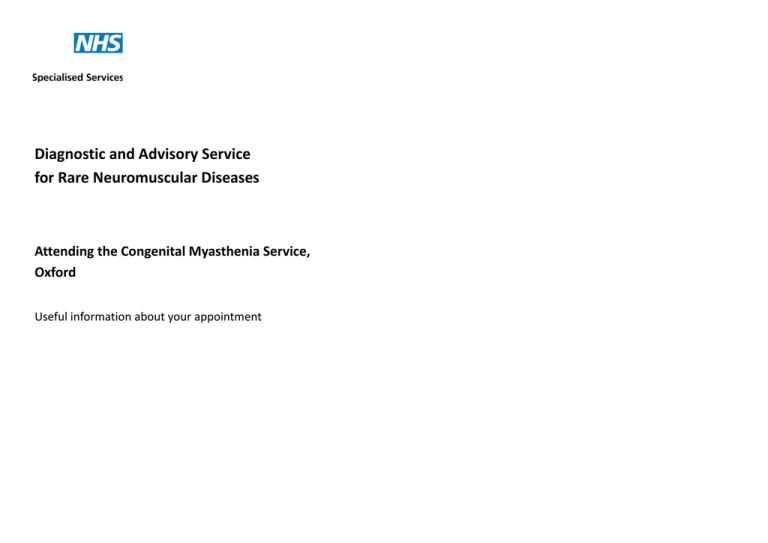
Diagnostic and Advisory Service for Rare Neuromuscular Diseases Attending the Congenital Myasthenia Service, Oxford Useful information about your appointment Why you have been asked to attend this clinic The Congenital Myasthenia Service is a national outpatient clinic. You or your child have been referred to us by your local specialist because they have questioned whether you or your child may have a congenital myasthenic syndrome (CMS). Congenital myasthenic disorders are a group of rare genetic neuro‐ muscular disorders. The different genetic subtypes respond to different treatments. Our team will assess whether you or your child is likely to have CMS or alternatively confirm that you don’t have CMS. If the team think that CMS is likely, seeing you will help to decide which gene to test. We are also able to advise on drug treatments and other management for congenital myasthenia. The West Wing and Children’s Hospital, John Radcliffe Hospital 2 If we think that CMS is not the diagnosis then we will not test the CMS‐causing genes. We will also write to your specialist to let them know we have excluded this and may make suggestions for other diagnoses that your specialist could investigate. If a diagnosis of CMS has already been made then you may be referred here for advice on management. When you arrive you will either go to the outpatient clinic or to an EMG appointment in Neurophysiology first – please see below for directions on exiting the lift. The first page of this appointment letter will tell you the time and order of appointments. Some people will only have one clinic appointment. Please allow up to half a day when attending. The actual time taken will depend on what tests are re‐ quired. On exiting the lift, please take the direction of your first appointment Neuroscience Outpatients Neurophysiology Dept (EMG apt) LIFTS ON LEVEL 3, WEST WING Level 2 Level 1 Level 0 Level LG1 Lower Ground Floor is the Car Park level Level LG2 3 At the clinic appointment The team is made up of an adult Consultant Neurologist, one or two Paediatric Consultant Neurologists (in Paediatric clinic only), a Genetic Specialist and a Clinical Fellow. Other people who might be there include a Physiotherapist and a Research Nurse. The service is based in Oxford but every two months the Paediatric clinic takes place in Great Ormond Street Hospital in London. If you would prefer your child to be seen at the GOSH clinic then please contact us. Tests we may ask you to have in clinic Blood test – either for genetic testing or for an antibody test. (Numbing cream is available for children.) Physiotherapy assessment – some people will have a formal strength assessment to assess muscle fatigue. Clinical photographs or videos. 4 At the EMG appointment Not everyone will have an appointment for an EMG test. If you do this will be on the front of your letter and a separate information sheet about the tests will be enclosed. The EMG test This takes place in the Neurophysiology Department also on Level 3 of the West Wing. This test measures the electrical activity in muscles and nerves. Results of tests won’t be available on the day of clinic. Genetic testing usually takes a couple of months for each gene tested. The EMG recordings need to be analysed by the doctor who performs the test who sends the report to us. We will write to your specialist with the results of tests and you will receive a copy of the letter. What/who should I bring with me? Please bring along any current medication. Bring along family or friends you wish to support you. Length of appointment 45 minutes is allocated for a first clinic appointment. If you also have an appointment for an EMG test you will have been notified of the time in this letter. The EMG test usually takes around half an hour for adults. For children this may take longer (allow up to an hour and a half) to allow the anaesthetic cream to take effect. 5 What will happen after the appointment? We will write back to the doctor who referred you to us with our opinion and a plan. You and your GP will also receive a copy of this letter in the post. We will write separately with results of blood or EMG tests, if these are not included in the initial letter. If we think you or your child has congenital myasthenia ,then we would like to continue to see you in this clinic. You should keep seeing your local specialist as well as coming to Oxford. If you find the distance too far to travel, then it is possible for us to offer advice remotely to your specialist. If we are not certain whether you or your child has the condition, we may ask to see you again. We will make this clear in the letter. If after we see you we think that you or your child does not have congenital myasthenia, then we will not arrange to see you again at this clinic. You should see your local specialist who referred you to us to discuss your further care. Help with transport and parking costs Patients on certain benefits may claim all or part of the cost of travel to and from hospital. Further information is available: www.ouh.nhs.uk/patient‐guide/transport‐costs www.dh.gov.uk Please call the Cashiers Office on 01865 221602 6 Places to visit around Oxford If you are staying in Oxford the night before or after your appointment please find below a few attractions that you may wish to visit on your stay. Oxford Castle – Central Oxford Botanic Garden – Central Oxford Bodleian Library – Central Oxford Museums: Natural History / Pitt Rivers, Ashmolean – Central Oxford Didcot Railway Centre – Didcot Blenheim Palace – Cotswolds For more information please see: www.visitoxfordshire.com Useful contact information Oxford CMS Service Birute Saul: 01865 231915 / cmsgenetics@ouh.nhs.uk Government information on carers and disability benefits www.gov.uk/browse/benefits/disability Benefit enquiry line: government phone line for general information Tel: 0800 882 200 Blue Badge Parking Scheme : contact your local council or visit www.gov.uk/apply‐blue‐badge Occupational therapy services: contact your local council or visit www.nhs.uk/Conditions/occupational‐therapy 7 Birute Saul Oxford Congenital Myasthenia Service February 2015 www.ouh.nhs.uk 8
